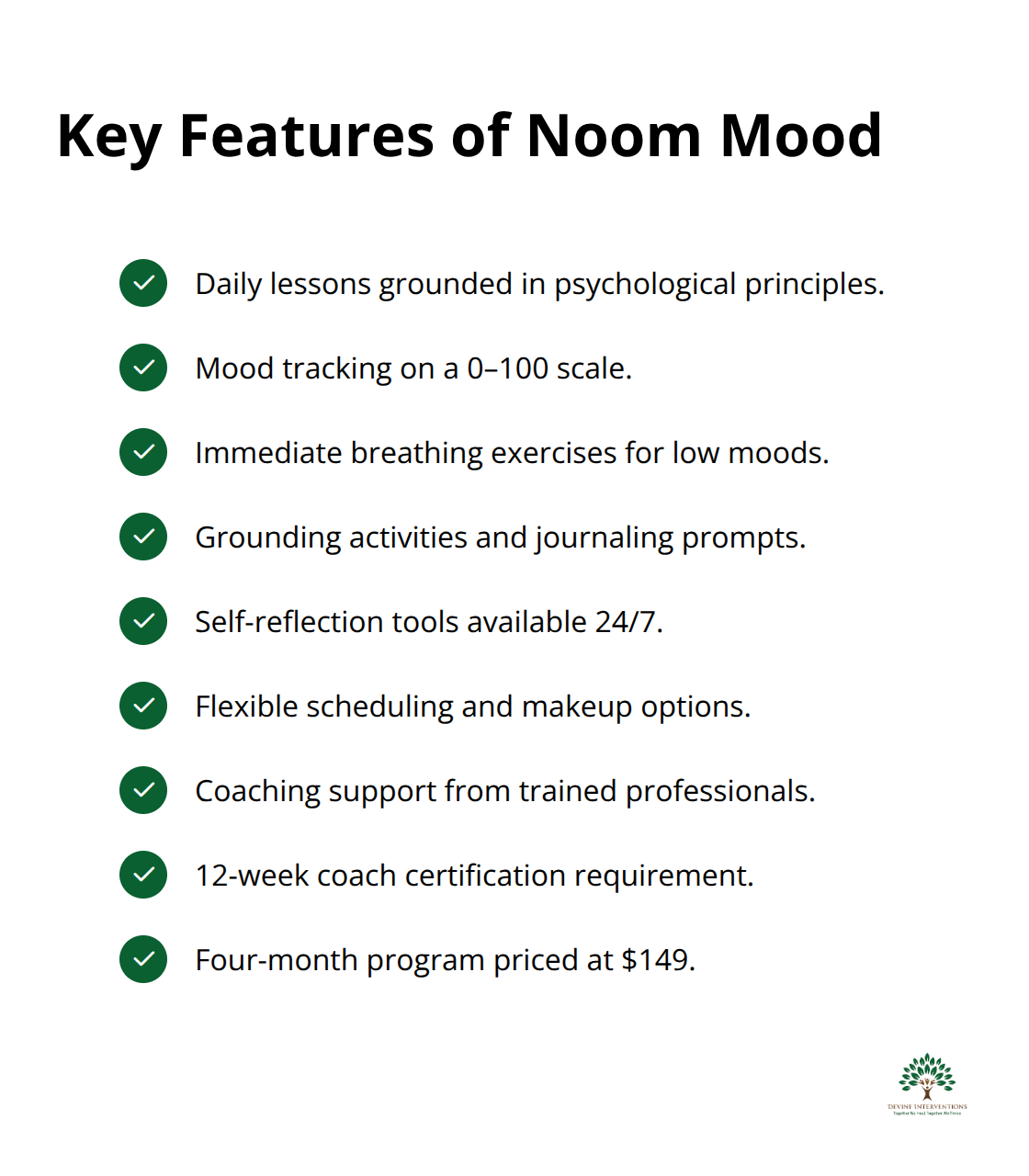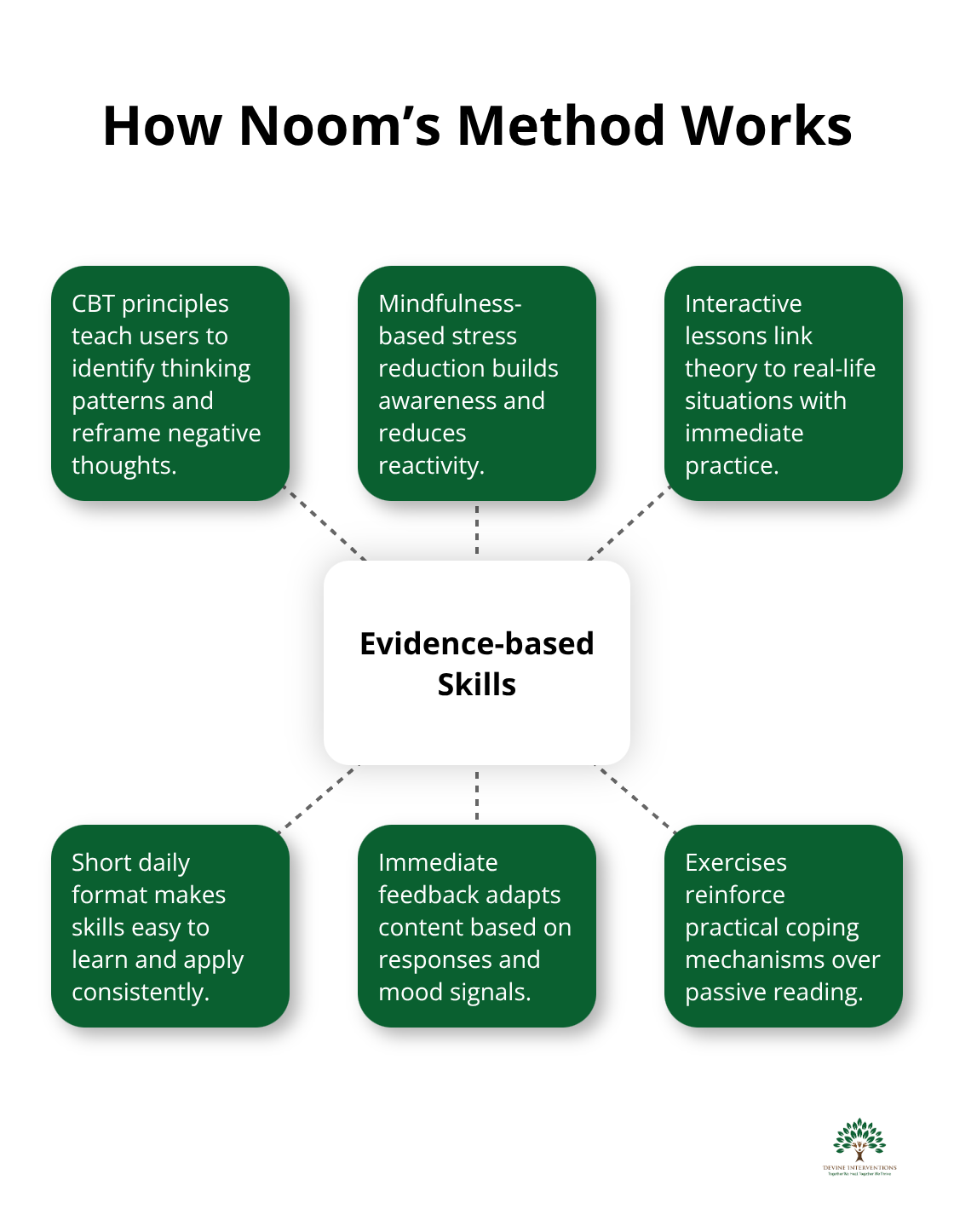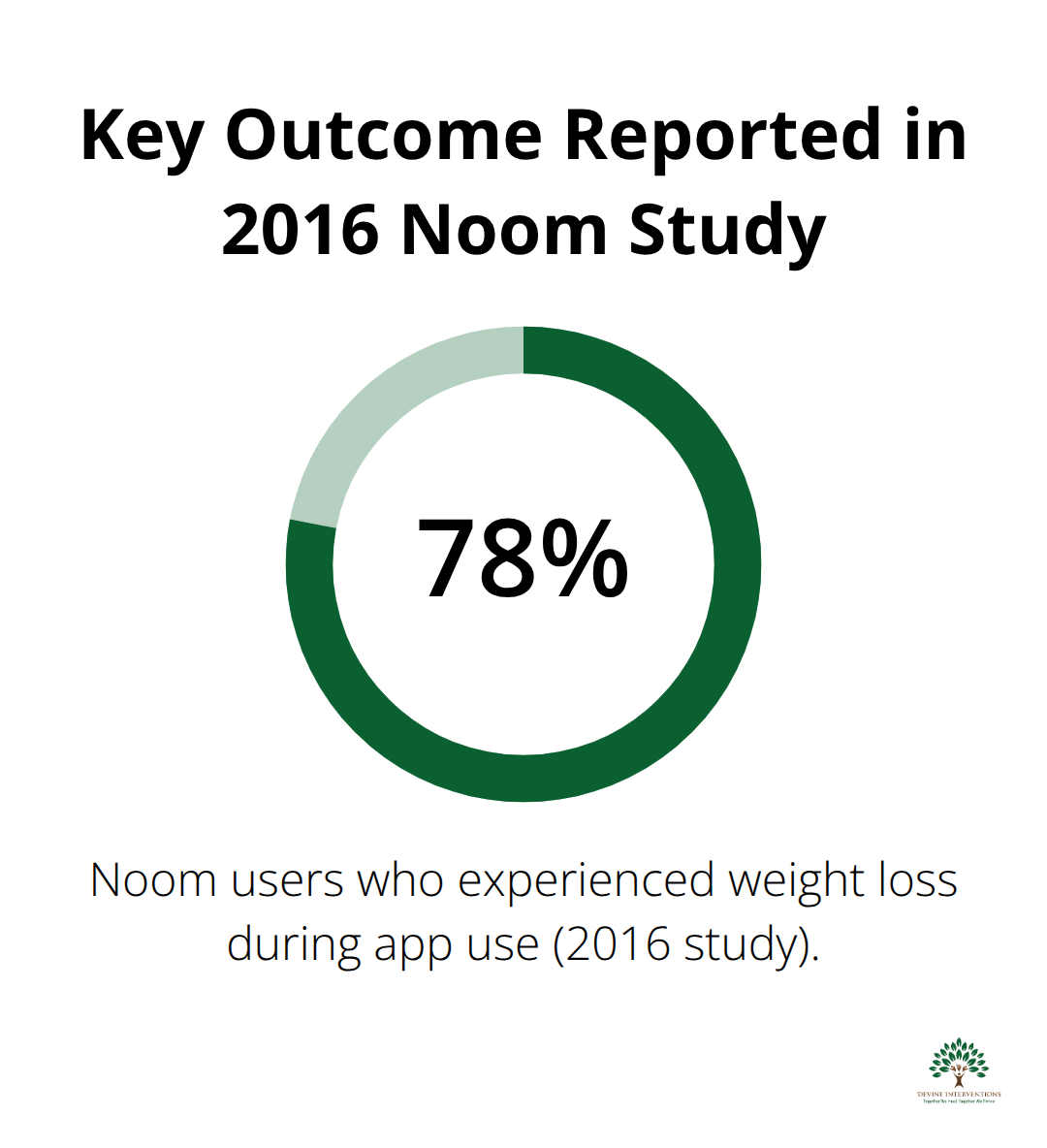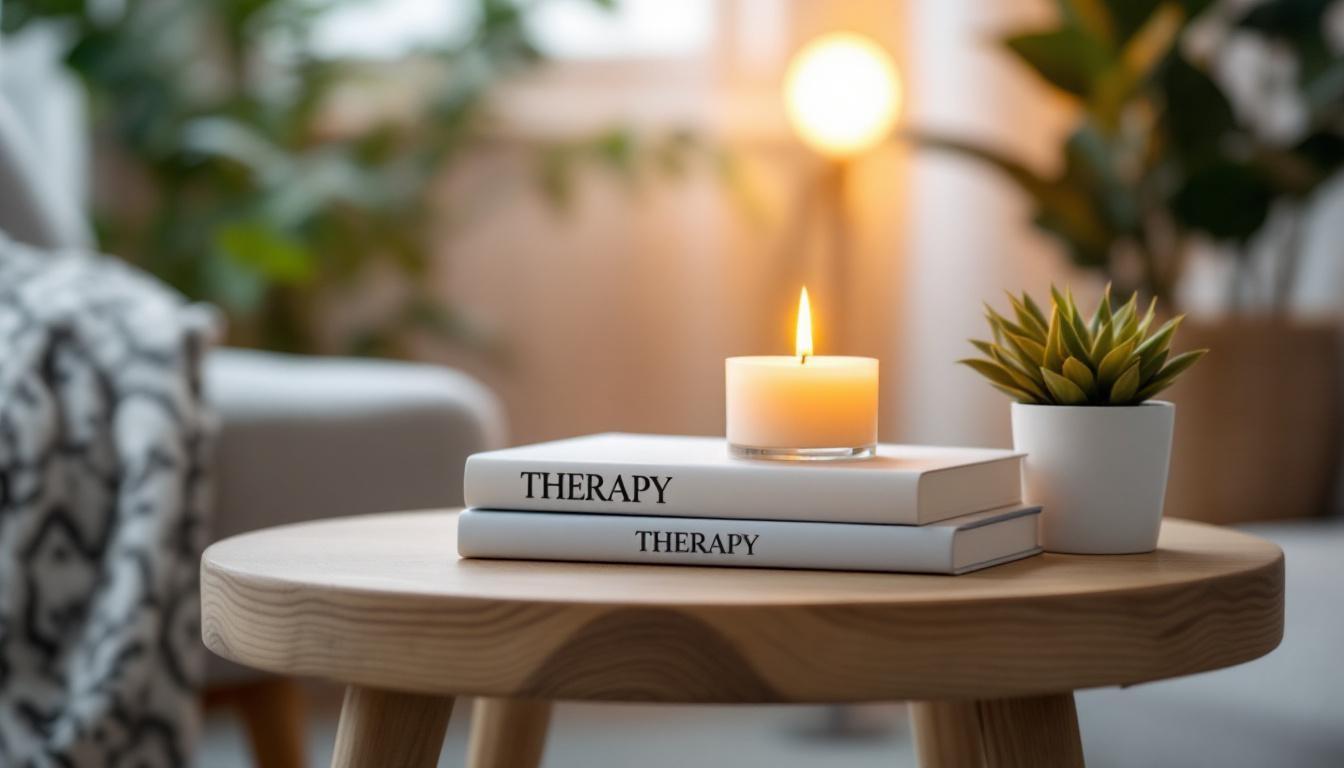Mental health apps have transformed how people access support, but finding the right program can feel overwhelming. The Noom Mental Wellness Course Pack promises a science-based approach to emotional wellbeing through structured courses and personalized guidance.
We at Devine Interventions evaluated this platform to help you make an informed decision. This comprehensive Noom Mental Wellness Course Pack review examines the program’s effectiveness, user experience, and value compared to traditional therapy options.
What Does Noom Mental Wellness Include
The Noom Mental Wellness Course Pack centers around Noom Mood, which launched in October 2021 as a comprehensive mental health support system. The program delivers daily lessons that build on psychological principles, provides mood tracking on a 0-100 scale, and creates personalized coping strategies based on your initial mental health assessment.
Users receive immediate breathing exercises when they log low moods, access grounding activities, complete journaling prompts, and use self-reflection tools available 24/7. The four-month program costs $149 with flexible scheduling that allows users to adjust missed lessons without penalty, and includes coaching support through trained professionals who complete a 12-week certification program.

Target Audience and Mental Health Applications
Noom Mood specifically targets adults who experience everyday stress management challenges rather than severe mental health conditions. The 2024 American Psychological Association Stress in America report found average stress levels at 5 out of 10 among over 3,300 U.S. adults, which makes this program relevant for widespread stress concerns.
The platform works best for individuals who seek educational support and habit formation rather than clinical intervention, as it explicitly states it cannot replace professional therapy or provide medication guidance. The program encourages users to take 15 minutes daily for stress management activities and normalizes mental wellness management in small, manageable steps.
Pricing and Accessibility Structure
The $149 four-month subscription breaks down to approximately $37 monthly, which positions it below traditional therapy costs but above basic meditation apps. Users can cancel anytime though the company doesn’t guarantee refunds, which creates a financial commitment that may motivate completion.
The program includes flexible notification scheduling, missed lesson makeup options, and an SOS plan feature for re-engagement after periods of inactivity. However, users cannot select coaches based on specific qualifications or expertise areas, which limits personalization compared to traditional therapy matching processes (where clients often choose therapists based on specialties and credentials).
Course Structure and Daily Experience
Each daily lesson takes approximately 15 minutes and focuses on specific stress management concepts through interactive content. The program adapts to user responses and provides immediate feedback when mood scores indicate distress. Users can skip daily activities without guilt when time constraints arise, though consistent participation yields better outcomes.
The app sends customizable notifications to remind users of daily lessons and allows them to schedule reminders at their convenience. This flexibility promotes consistent engagement while accommodating varying schedules and life demands that often contribute to stress levels.
This structured approach to mental wellness education sets the foundation for examining how effectively these methods translate into measurable outcomes and user satisfaction.
How Does Noom’s Mental Wellness Method Work
Noom Mood builds its foundation on cognitive behavioral therapy principles and mindfulness-based stress reduction techniques, both backed by decades of clinical research. The program transforms psychological concepts into digestible daily lessons that teach users to identify thought patterns, reframe negative thoughts, and develop practical coping mechanisms. Each lesson connects theoretical knowledge to real-world application through interactive exercises that require users to practice techniques immediately rather than passively consume information.

Interactive Learning and User Experience
The platform transforms traditional therapy concepts into smartphone-friendly activities that take exactly 15 minutes daily. Users complete mood check-ins on a 0-100 scale that trigger immediate interventions when scores fall below personalized thresholds, which provides breathing exercises and grounding techniques within seconds. The journal feature prompts specific questions rather than open-ended writing, which guides users toward productive self-reflection.
Daily activities range from gratitude exercises to stress-mapping assignments, though many users report these activities feel vague and lack specific guidance compared to structured therapy homework. The app’s notification system adapts to individual schedules and allows users to reschedule missed lessons without penalty, which maintains engagement without creating additional stress.
Progress Tracking and Personalized Adaptation
Noom Mood creates individualized four-month plans based on initial assessment responses and adjusts content difficulty and focus areas according to user progress and mood patterns. The system tracks completion rates, mood trends, and engagement levels to modify future lesson recommendations, though users cannot influence these algorithmic decisions directly.
Weekly progress reports show mood stability trends and highlight behavioral pattern changes (providing concrete data that many traditional therapy approaches lack). The SOS plan feature allows users to create personalized crisis management strategies that activate during periods of inactivity or distress, though this reactive approach may not prevent mental health episodes as effectively as proactive professional intervention.
Limitations of App-Based Mental Health Support
While Noom Mood offers convenient access to mental health tools, it cannot replace the personalized attention and clinical expertise that professional therapy provides. The app’s standardized approach may miss complex underlying issues that require individualized assessment and treatment planning (something that licensed mental health professionals excel at identifying and addressing).
These technological limitations highlight why many individuals benefit most from comprehensive mental health services that combine evidence-based practices with genuine human connection and professional clinical oversight.
Does Noom Mood Actually Work
Research Data and Clinical Evidence
A 2016 study tracked nearly 36,000 Noom users and found that 78% experienced weight loss while using the app, but specific data for the mental wellness program remains limited.

The Noom Mood platform launched only in October 2021, which means comprehensive long-term studies haven’t been completed yet. However, users consistently report reduced food noise and improved stress management skills within the first month of consistent use.
The program lacks peer-reviewed research specifically validating its mental health outcomes, unlike established therapeutic approaches that have decades of clinical validation. This research gap makes it difficult to predict individual success rates or compare effectiveness against proven treatment methods.
User Feedback and Success Patterns
Noom maintains positive user feedback, though most reviews focus on weight management rather than mental wellness specifically. Users frequently mention that daily lessons help change their mindset toward stress management and that the 15-minute daily commitment feels sustainable compared to traditional therapy’s 50-minute sessions.
The immediate breathing exercises triggered by low mood scores receive positive feedback for providing instant relief during stressful moments. However, many users find the daily activities too vague and report needing additional guidance to implement techniques effectively. Success rates appear highest among users who complete the full four-month program consistently (though the company hasn’t published specific completion or outcome statistics for mental wellness participants).
Professional Mental Health Care Comparison
Traditional therapy typically costs $100-200 per session, making Noom’s $37 monthly cost significantly more affordable for ongoing support. However, licensed therapists can diagnose conditions, prescribe treatment plans, and provide crisis intervention that apps cannot offer. Professional therapy identifies underlying issues that standardized apps miss entirely through comprehensive assessments and personalized treatment approaches.
The combination of individual therapy, group sessions, and medication management creates personalized treatment that adapts to complex mental health needs rather than following predetermined algorithms. Licensed mental health professionals can also coordinate care with other healthcare providers and adjust treatment plans based on real-time clinical observations.
Final Thoughts
This Noom Mental Wellness Course Pack review reveals a program with clear strengths and notable limitations. The $149 four-month investment provides structured daily lessons, immediate mood interventions, and flexible schedules that make mental wellness support accessible. The evidence-based approach uses cognitive behavioral therapy principles and offers genuine value for stress management education.
The program cannot replace professional mental health care when complex issues require clinical assessment, personalized treatment plans, or crisis intervention. The standardized approach may miss underlying conditions that licensed professionals identify through comprehensive evaluation (something that requires human expertise and clinical training). Individuals with severe mental health conditions, those who need medication management, or people who require personalized therapeutic relationships benefit more from professional care.
We at Devine Interventions understand that mental health support requires careful consideration of your specific needs. Our services include individual therapy, medication management, and specialized treatment programs that provide personalized attention and clinical expertise. Contact Devine Interventions today to discuss how our evidence-based approach and compassionate care can support your mental wellness journey with professional guidance.







